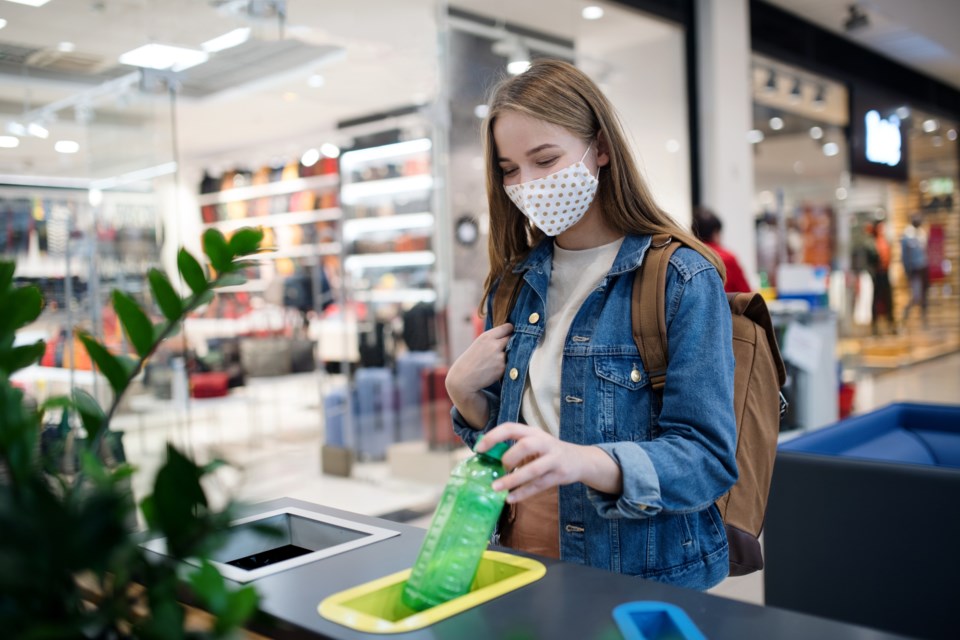The year 2022 is expected to bring significant changes to the way British Columbians take their purchases out of stores. The efforts of municipalities to reduce the reliance of residents on single-use plastics will continue, whether in the form of bans on plastic grocery checkout bags or through an added fee for single-use coffee cups and other containers.
Richmond, Surrey and Victoria have already implemented regulations related to single-use plastic bags. In Vancouver, plastic bags will also be gone from checkouts, and paper ones—which will have to be comprised of at least 40 per cent of recycled materials—will cost 15 cents each in 2022 and 25 cents in 2023.
Also in Vancouver, single-use beverage cups will only be handed out by coffee shops upon payment of a minimum 25-cent fee. This is a drastic change from the way in which these establishments used to operate, essentially rewarding customers for bringing their own reusable mugs—although this practice had to be shelved during the COVID-19 pandemic to reduce the possibility of contagion.
British Columbians, who were pioneers in the development and successful implementation of recycling programs in the 20th Century, have long been in favour of taking action on this front. In a survey conducted by Research Co. and Glacier Media at the start of this year, 82% of the province’s residents expressed support for the ban on single-use plastics proposed by the federal government, which would include grocery checkout bags, straws, stir sticks, six-pack rings, plastic cutlery and food takeout containers made from hard-to-recycle plastics.
As 2021 is about to end, there is no change in the way British Columbians feel about these proposed regulations, with 82% supporting the federal government’s intentions, 12% opposed and 5% undecided. Banning single-use plastics is widely backed across all regions of the province, starting at 77% in both Northern BC and the Fraser Valley, and reaching 82% in Metro Vancouver, 86% in Southern BC and 87% on Vancouver Island.
When it comes to our own behaviour, the needle has not moved dramatically over the past 12 months, which have featured the (almost full-time) return of our usual in-store buying habits.
We found this month that three in four British Columbians (76%) transport groceries out of a store in their own reusable bag, down just one point since January. We still have 20% of purchasers who rely on single-use bags, asking for paper when possible (10%, down one point) or plastic (9%, also down one point).
The big gap on the grocery transportation question is generational. While practically nine in ten British Columbians aged 55 and over (88%) bring their own reusable bag inside grocery stores, the proportion drops to 73% among those aged 35 to 54 and to 62% among those aged 18 to 34.
On other issues related to conservation, there are a couple of noteworthy fluctuations. In January, 54% of British Columbians acknowledged going out of their way to recycle, such as holding on to bottles and cans until they can be placed into the adequate bin. This month, the proportion has fallen slightly to 51%.
Residents of Vancouver Island and Northern BC are more likely to always take recycling seriously (65% and 63% respectively) than their counterparts in Southern BC (58%), the Fraser Valley (57%) and Metro Vancouver (44%).
Another issue where the numbers have shifted is limiting hot water usage at home. In January, just over a quarter of British Columbians (26%) said they were always taking shorter showers or running the washing machine or dishwasher with full loads only. In December, the proportion of disciplined energy savers has dropped to 20%. Once again, residents aged 55 and over are more likely to consistently be mindful of water usage (29%) than those aged 35 to 54 (15%) and those aged 18 to 34 (14%).
We see little change on three other issues that we track: Always unplugging electrical devices at home when they are not in use (12%, down one point), always buying biodegradable products (5%, down two points) and always eating organic or home-grown foods (also 5%, down two points).
As was the case at the start of the year, support for enhanced regulations related to the use of plastic is strong, but the behaviour of some British Columbians continues to lag in comparison. One of the sought goals of the new guidelines is to change the actions of consumers. We will have to see if, at the end of 2022, the province’s youngest generations have abandoned single-use plastics in the same fashion as the oldest.
Mario Canseco is president of Research Co.
Results are based on an online study conducted from December 21 to December 23, 2021, among 800 adults in British Columbia. The data has been statistically weighted according to Canadian census figures for age, gender and region. The margin of error—which measures sample variability—is +/- 3.5 percentage points, nineteen times out of twenty.




